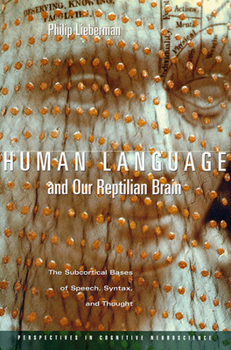Human Language and Our Reptilian Brain: The Subcortical Bases of Speech, Syntax, and Thought
Select Format
Select Condition 
Book Overview
This book is an entry into the fierce current debate among psycholinguists, neuroscientists, and evolutionary theorists about the nature and origins of human language. A prominent neuroscientist here takes up the Darwinian case, using data seldom considered by psycholinguists and neurolinguists to argue that human language--though more sophisticated than all other forms of animal communication--is not a qualitatively different ability from all forms of animal communication, does not require a quantum evolutionary leap to explain it, and is not unified in a single "language instinct."
Using clinical evidence from speech-impaired patients, functional neuroimaging, and evolutionary biology to make his case, Philip Lieberman contends that human language is not a single separate module but a functional neurological system made up of many separate abilities. Language remains as it began, Lieberman argues: a device for coping with the world. But in a blow to human narcissism, he makes the case that this most remarkable human ability is a by-product of our remote reptilian ancestors' abilities to dodge hazards, seize opportunities, and live to see another day.Format:Paperback
Language:English
ISBN:067400793X
ISBN13:9780674007932
Release Date:May 2002
Publisher:Harvard University Press
Length:240 Pages
Weight:0.80 lbs.
Dimensions:0.7" x 6.2" x 9.3"
Customer Reviews
3 ratings
Revolutionary insights not yet fully elaborated
Published by Thriftbooks.com User , 19 years ago
Last spring (2004)I was thinking about language understanding and thought, and I speculated that maybe both ran off the same brain circuits as all motor behavior and was derived from internalization of speech. I had just started learning about the basal ganglia and the orbito-frontal system involvement in prediction and sequencing. I went to the SF Cognitive Neuroscience meeting, and I met one of Lieberman's graduate students presenting a poster. When I started to share my views, he told me about Lieberman's book. Within a week I had it and had finished it, and my view of cognition and many other things has not been the same since. Neuroscience, linguistics and philosophy have yet to fully absorb the multple implications that fall out of Lieberman's insights. That the basal ganglia (our reptilian brain) are a key component of our "functional language system" as Lieberman argues is, in my widening view, only a starting point. There is a lot more here to be revealed about reason, thought, consciousness, and the place of mind in nature. Until I get published (don't hold your breath) persons interested in these subjects should at least consider that with all the talk about the 'embodied mind' going on for more than a decade now, there have been very few specific proposals put on the table of how the things we associate with mind (awareness, reason, thought, intelligent problem solving etc) are actually embodied. Read this book and realize that the basal ganglia are the place in the brain "where the rubber meets the road" between all our stored knowledge and expectations and our actual moment to moment choices in action and those implicit in the stream of thought. These circuits are right there in the middle of where our lives are unfolding. Don't be a zombie. Get a grip on the gator within. :-)
Original and provocative
Published by Thriftbooks.com User , 20 years ago
A highly original and intriguing thesis on the evolution of brain and language. Lieberman traces the origins of language syntax computations to brain mechanisms evolved originally to cooridinate complex patterns of action. Although I am not expert in linguistics, I take a basic biopsychology pespective onthe neuroscience of pattern generation, and see Lieberman's book as a novel voice that bridges disciplines in a valuable way. This book reinvigorates notions of 'action syntax' and provides a unique interdisciplinary perspective.
Chomsky would be turning in his grave(if he were dead)
Published by Thriftbooks.com User , 23 years ago
Lieberman's "Human Language and Our Reptilian Brain" is a surprisingly readable and fascinating exploration of language and the brain by one of the most ardent anti-Chomskyian neurolinguists writing today(Lieberman, a professor at Brown Univeristy, embodies a healthy opposition to the Chomsky/Pinker madness at MIT). The thesis of the book is that there is no one neural center or "seat" of the human capacity for language. Rather, what we call "language" is in fact a functional system distributed throughout the brain, and is entangled with subcortical circuitry that is not normally associated with language function. Lieberman discredits the blatant intuitionism of Chomskyian linguistics by citing some of the most recent studies in neurolinguistics.The book assumes some knowledge of neural anatomy, and serious scholars are encouraged to make use of the bibliography. But I think that Lieberman's work exemplifies the neuroscientific approach to understanding human behavior, and I recommend this book for anyone with an intellectual stake in the nature of language and the brain.






